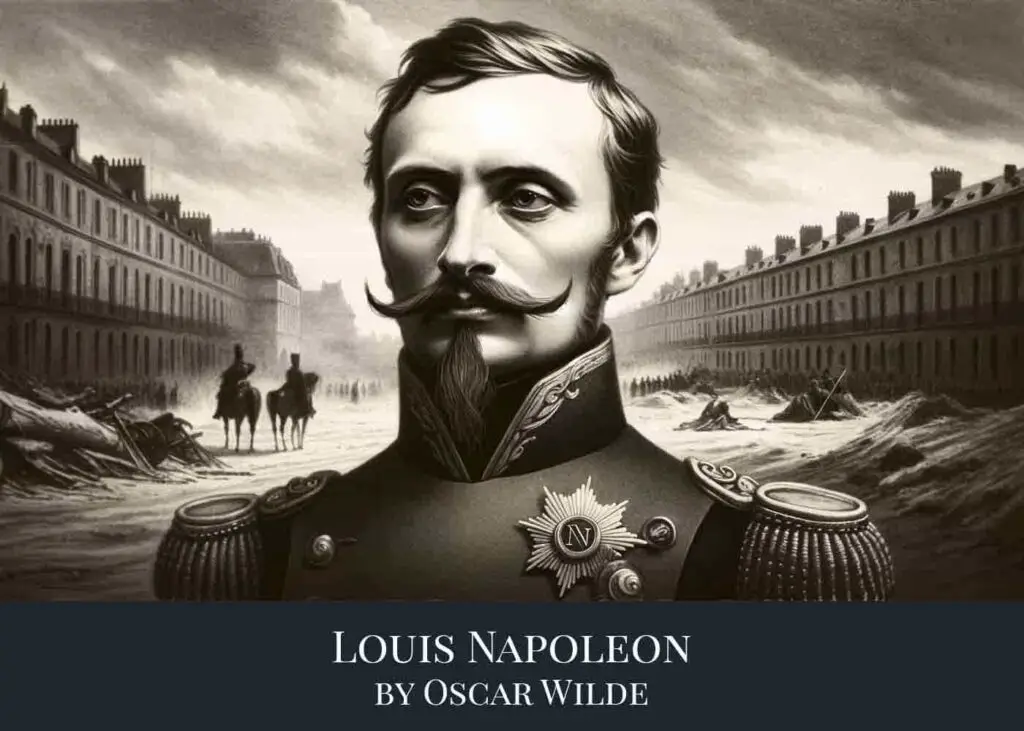
Louis Napoleon by Oscar Wilde
“Louis Napoleon” is a poem by poet, dramatist, and writer Oscar Wilde, featured in his first poetry collection Poems. In this piece, Wilde reflects on the life and fall of Louis Napoleon, the last Emperor of France, Napoleon III. The poem begins with a dramatic address to the “Eagle of Austerlitz,” a symbolic reference to Napoleon Bonaparte and his famous battle, and contrasts this glory with the fate of his nephew, Louis Napoleon.
For readers interested in exploring more of Oscar Wilde’s poetic work, the Poems ebook is available at PageVio.
1. The Poem
Eagle of Austerlitz! where were thy wings
When far away upon a barbarous strand,
In fight unequal, by an obscure hand,
Fell the last scion of thy brood of Kings!
Poor boy! thou shalt not flaunt thy cloak of red,
Or ride in state through Paris in the van
Of thy returning legions, but instead
Thy mother France, free and republican,
Shall on thy dead and crownless forehead place
The better laurels of a soldier’s crown,
That not dishonoured should thy soul go down
To tell the mighty Sire of thy race
That France hath kissed the mouth of Liberty,
And found it sweeter than his honied bees,
And that the giant wave Democracy
Breaks on the shores where Kings lay couched at ease.
Download Louis Napoleon Poster
Size: 8″ x 12″ (2:3 ratio)
Format: PDF
Copyright information: For personal use only
Note: Actual poster background color is white. For the sample poster, the background is made gray for illustration purpose.
2. Louis Napoleon Analysis
“Louis Napoleon” poem by Oscar Wilde is a poignant reflection on the fate of Napoleon III, the nephew of Napoleon Bonaparte, who is metaphorically referred to as the “Eagle of Austerlitz” — a reference to his uncle’s famous victory at the Battle of Austerlitz. The eagle, a symbol of the Napoleonic empire’s power, is questioned about its absence when Napoleon III faced defeat and capture during the Franco-Prussian War (the “fight unequal” on a “barbarous strand,” likely referring to his last battle at Sedan).
The “last scion of thy brood of Kings” suggests that Napoleon III, as the last emperor of France, met an ignominious end, far from the glory that his uncle once knew. The “obscure hand” that felled him implies that his defeat was not by a renowned adversary but rather by a lesser-known entity, emphasizing the insignificance of his fall compared to the legendary status of his forebear.
The poem then addresses Napoleon III directly (“Poor boy!”), noting that he will not have the chance to celebrate his military might (“flaunt thy cloak of red” or “ride in state through Paris”) as his legions will not return in triumph. Instead, France, personified as his mother and now “free and republican,” will place on his “dead and crownless forehead” the more honorable laurels of a soldier, not as an emperor but as someone who fought and died for his country.
Wilde contrasts the fate of Napoleon III with the spirit of the new France, which has embraced republicanism over monarchy. The soul of Napoleon III is not dishonored as he descends to the afterlife (“To tell the mighty Sire of thy race”) because France now values the principles of liberty (“kissed the mouth of Liberty”) and democracy (“the giant wave Democracy”) over the hereditary rule and ease of kings.
The poem uses rich imagery and poignant contrasts to comment on the shift from imperial rule to democratic republic in France, viewing this political evolution as a more honorable and sweet embrace of freedom and the collective will of the people over individual dynastic power.
3. Conclusion
If Oscar Wilde’s “Louis Napoleon” has stirred you with its poignant depiction of a fallen leader and the embrace of liberty, you might find further inspiration in exploring more of Wilde’s poetic works.